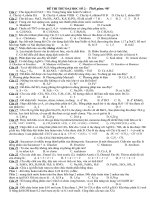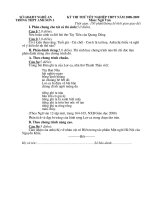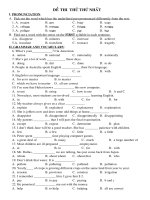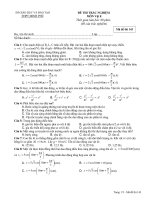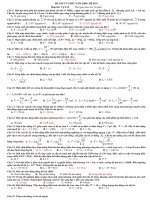DE THI THU TN SO 1
Bạn đang xem bản rút gọn của tài liệu. Xem và tải ngay bản đầy đủ của tài liệu tại đây (33.54 KB, 3 trang )
ÑEÀ THI THÖÛ THÖÙ NHAÁT
I. PRONUNCIATION:
A. Pick out the word which has the underlined part pronounced differently from the rest.
1. A. reason B. sun C. busy D. easy
2. A. culture B. mature C. future D. nature
3. A. pollute B. mute C. put D. but
B. Find out a word with the stress on the FIRST syllable in each sentence.
4.A. disappear B. minutes C. increase D. achieve
5.A. translate B. transform C. transact D. tragedy
II. GRAMMAR AND VOCABULARY:
6. What’s your____________? I’m American.
A. nation B. national C. nationality D. nationally
7. She’s got a lot of work ___________ these days.
A. doing B. did C. done D. to do
8. People in Australia speak English ___________ their first language.
A. to B. for C. as D. with
9. English is an important language ____________.
A. for us to master B. to master
C. which we have to master D. all are correct
10. I’m sure that Helen knows ____________ this new computer.
A. to use B. using C. how to use D. A and C
11. Nowadays, most students are involved ____________ learning English.
A. in B. with C. for D. for
12. My teacher always gives us a clear ___________.
A. explain B. explained C. explanatory D. explanation
13. She is jobless now and does some odd things at home___________.
A. disappoint B. disappointed C. disappointedly D. disappointing
14. My parents __________ that I will pass the final examination.
A. except B. expect C. determine D. plan
15. I don’t think Jane will be a good teacher. She has ________ patience with children.
A. few B. a few C. little D. a little
16. Peter spent ___________ time playing computer games.
A. a great deal of B. many C. much D. a large number of
17. Most children are ill-prepared ____________ employment.
A. at B. to C. for D. with
18. Mr. Dullas, _____________ we are talking, has just come back from Japan.
A. whom B. about whom C. about that D. who
19. Don’t drink that water. It is ____________.
A. pollute B. polluting C. polluted D. pollution
20. Yearly____ of crops is growing different crops on the same land from year to year.
A. erosion B. provision C. rotation D. irrigation
21. I remember _____________ him. I gave him $ 2.
A. pay B. to pay C. paying D. b and c
22. He promised ____________ me out with the money.
A. help B. to help C. helping D. all are correct
23. We ____________ discarded products to conserve minerals.
A. waste B. recycle C. produce D. safeguard
24. Natural resources could never be used up,______________?
A. couldn’t they B. could they C. had they D. didn’t they
25. Do you feel like _____________ out for a drink?
A. go B. going C. to go D. all are correct
III. READING : A. Read the text carefully and then choose the correct answers:
Germany had one of the lowest rates of unemployment back in 1980. It stood at just 3%. Now
the rate is increasing. The United States has had ups and downs. In 1980, it was about 2%; 7.5% in
1981 and in 1984, it was the same rate as in 1980. Great Britain heads the employment chart. In
1980, their situation was the same as the United States. There followed a sharp rise in 1981, when
the rate was 10.5%. This rose gradually over the next two years to 13%. In 1984, there was no great
change, but in 1985 saw another increase to about 13.5% and figures do not look as though they are
on their way down yet.
26. What was the rate of unemployment in Germany in 1980 ?
A. 2% B. 3% C. 7.5% D. 13%.
27. What was the rate of unemployment in the US in 1984 ?
A. 2% B. 3% C. 7.5% D. 13%.
28. Which country had the highest rates of unemployment?
A. Germany B. France C. The US D. England.
29. When did England have the highest rate in 1980s ?
A. 1980 B. 1981 C. 1984 D. 1985.
30. In England, the rate of unemployment is .
A. on their way down. B. not on their way down
C. not increasing D. lowest.
B. Read the text and decide which words from the list below the text best fits each blanks:
German is spoken in Austria as the (31) language but many people also speak English.
When I arrived (32) Salzburg, I asked a railway official if he could(33) me the
way to Goldener Hisch hotel (34) my friend Jane had said was in the old city. The official
replied (35) quite good English, but he spoke (36) fast that I didn’t understand much of
what he was saying. I decided I had (37) ask someone else. I found a policeman outside the
station. He was very glad because he could practise his English with an English girl, and we
(38) together for about ten minutes . I then began to look (39) the hotel and found it
half an hour later, although, to tell you the truth, I’m not sure (40) I could do it.
31. A. nation B. native C. national D. nationality.
32. A. to B. in C. toward D. from.
33. A. say B. speak C. tell D. talk.
34. A. where B. there C. which D. here.
35. A. by B. at C. with D. in.
36. A. very B. too C. enough D. so.
37. A. better B. rather C. sooner D. should.
38. A. said B. spoke C. talked D. told.
39. A. after B. at C. for D. up.
40. A. which B. how C. when D. why.
IV. WRITING:
A. Identify the one underlined words that must be changed to make the sentence correct :
41. The problems of pollution are too difficult for us to solving.
A B C D
42. She left the party in a hurry without to say goodbye to us.
A B C D
43. Please give me a few sugar in my coffee. I prefer it sweet.
A B C D
44. Although the bad traffic, I managed to arrive at the meeting on time.
A B C D
45. It is necessary for we to learn a foreign language nowadays.
A B C D
B. Choose the sentence (a , b ,c or d) which has a similar meaning to the original sentence :
46. A donkey is less beautiful than a horse.
A. A horse is not as beautiful as a donkey.
B. A donkey is not as beautiful as a horse.
C. A donkey is not as beautifully as a horse.
D. A donkey is a little more beautiful than a horse.
47. This mountain is very high; we can’t climb it.
A. This mountain is too high for us to climb.
B. This mountain is too high for us to climb it.
C. This mountain is so high that climb it.
D. This mountain is so high that we can’t climb.
48. The sleeping child is Mrs. Green’s son.
A. The child is sleeping is Mrs. Green’s son.
B. The child who sleeping is Mrs. Green’s son.
C. The child who is sleeping is Mrs. Green’s son.
D. All are correct.
49. Are you very tall? Can you reach that picture?
A. Are you tall enough for that picture to reach?
B. Are you too tall to reach that picture?
C. Are you so tall that can reach that picture?
D. Are you tall enough to reach that picture?
50. There is a tendency to study in a foreign country.
A. They have tended to study in a foreign country.
B. They tend studying in a foreign country.
C. They tend to study in a foreign country.
D. They are tending study in a foreign country.
THE END
